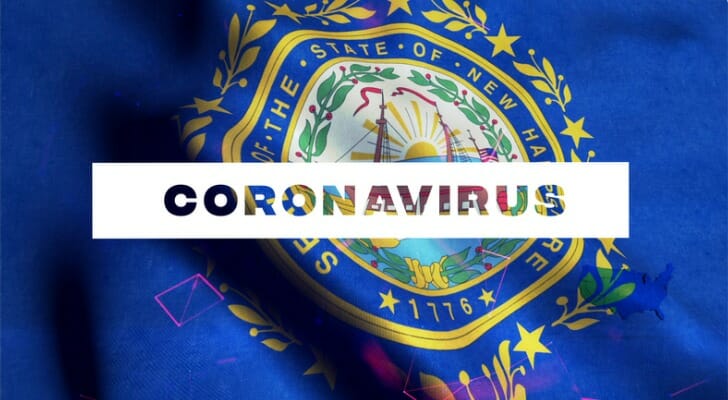New Hampshire is one of the smallest and most rural states in the U.S., so it makes sense that, compared to larger, more urban states, it has not been hit as hard by the COVID-19 pandemic. The state confirmed its first case on March 2; within six weeks it had 3,382 confirmed cases and 151 deaths. Individuals and small businesses in New Hampshire have access to some state programs. There are also plenty of federal programs available to businesses and individuals alike. If you’re looking for more specific help managing your finances during the coronavirus pandemic, talking to a financial advisor could be beneficial.
New Hampshire Coronavirus Relief for Individuals
In March, the Gov. Chris Sununu issued an executive order prohibiting utilities in the state from disconnecting any homes or businesses throughout the duration of the emergency. The order applies to water, natural gas, electricity, phones, internet and cable.
Also in March, Sununu eased the requirements to qualify for unemployment benefits and made the benefits more generous: from $32 to $168 per week; an additional $600 per week, from federal funding; and an extension of benefits from 13 weeks to 39 weeks.
In early May, the governor announced a new online portal to allow a broader range of Granite Staters to get tested for COVID-19. Anyone experiencing possible symptoms of the virus, as well as anyone 60 years old or older, anyone with a range of underlying conditions and health care workers, can schedule a test through the new portal, nh.gov/covid19, or by calling 603-271-5980.
The state’s largest city, Manchester, is offered residents COVID-19 testing through May 20. The free tests were available to residents who have symptoms or are in a high-risk group, according to the city’s Emergency Operations Center. For more information call the city’s COVID-19 hotine at 603-668-1547.
Residents of the Granite State also can use online government resources to learn which businesses are closed, as well as best practices to protect themselves and their family against the coronavirus pandemic. New Hampshire residents who have lost their jobs can take advantage of expanded federal unemployment benefits, described in more depth below.
New Hampshire Coronavirus Relief for Small Businesses
New Hampshire has an array of state-specific coronavirus relief programs for small businesses. Sununu had the state move a large portion of its cash reserves to small New Hampshire banks so loans to small businesses could be increased. The state also has eased licensing requirements and permitted online notarization.
Eligible businesses in New Hampshire are also able to take advantage of these programs in addition to any any federal programs that they’re eligible for.
Business Finance Authority (BFA)-CAP Program
The BFA’s Capital Access Program (CAP) is designed to help businesses who have been adversely affected by the COVID-19 outbreak. The flexible credit is utilized by New Hampshire banks in an effort to help these businesses, providing support on loans and lines of credit up to $200,000. Businesses can use this program for temporary loans, working capital, equipment purchases or other long term expenses. You can learn more here.
BFA Temporary Loans
The Business Finance Authority is also directly providing loans for a variety of purposes to businesses that have been affected by the COVID-19 outbreak. These loans range up to $200,000 in size, and they have a maximum term of three years, flexible amortization schedules and they are contingent on underwriting. BFA temporary loans require approval by the NH Executive Council. Find out more about the program here.
Community Development Finance Authority (CDFA) Assistance
The CDFA is providing a wide range of New Hampshire organizations, such as municipalities, businesses and nonprofits, with loans, grants and tax credits in an attempt to help with the economic side effects of the coronavirus pandemic. The CDFA is offering as much as $500,000 on a per organization basis. Learn more here.
Federal Coronavirus Relief for Individuals

The federal government has developed several coronavirus relief programs aimed at helping individuals and families through these difficult economic times. The Coronavirus Aid, Recovery, and Economic Security (CARES) Act offers a range of programs, most notably the one-time stimulus check payment program. These checks are available to most Americans who make less than $99,000 per year in adjusted gross income (AGI). Those who earn under $75,000 annually will receive the full amount of $1,200. Those earning between $75,000 and $99,000 will receive less with the more they earn. Families can receive an additional $500 for every child under 17 years of age.
That isn’t all the federal government is doing to help individuals and families during this economic downturn. The federal tax deadline has been extended to July 15, 2020, there are rent and mortgage payment relief programs in place and paid sick and family leave policies have been greatly expanded. Those who have found themselves unemployed due to COVID-19 are also eligible for $600 more in weekly benefits, as well as 13 additional weeks of benefits.
Federal Coronavirus Relief for Small Businesses
While New Hampshire does offer several of its own relief programs, the federal government is also working to make sure that businesses are covered. The Paycheck Protection Program (PPP) is designed to help employers cover payroll costs without having to lay off workers. Eligible businesses can get up to $10 million to cover 2.5 times their average monthly payroll, with the exception of salaries that exceed $100,000 annually. Parts of these loans are eligible for forgiveness as well.
The Economic Injury Disaster Loan (EIDL) Program is also a viable option for any business that’s been negatively impacted by the coronavirus outbreak. These loans range up to $2 million per eligible business and can cover a range of operational costs that businesses might not otherwise be able to pay for. EIDL applicants also receive a $10,000 advance grant upon applying for a loan, which does not need to be repaid. These grants serve as a way to help businesses cover costs before loan funds are disbursed.
Other federal programs available to small businesses include the SBA 7(a) Loan Program, the SBA Debt Relief Program, and the Express Bridge Loan Pilot Program, microloans and 504 loans.
Bottom Line

The state of New Hampshire hasn’t been crushed by the coronavirus outbreak, but it doesn’t mean that businesses, families and individuals aren’t still hurting, especially from a financial point of view. As residents are forced to stay at home and businesses are forced to close, lay people off or even go out of business entirely, the state is doing its best to come to their aid. So is the federal government, as there are a number of programs designed to help families, individuals and businesses across the country.
Tips for Retirement Planning During the Crisis
- If you’re worried about how your retirement accounts could be affected during these strange times, talking to a financial advisor could be helpful. SmartAsset’s free tool matches you with suitable financial advisors in your area in just five minutes. Get started now.
- Saving for retirement is a delicate task, especially when it comes to managing investments. There are a number of provisions in the CARES Act that can affect your 401(k) and IRA accounts.
Photo credit: ©iStock.com/blackdovfx, ©iStock.com/DenisTangneyJr, ©iStock.com/DenisTangneyJr
